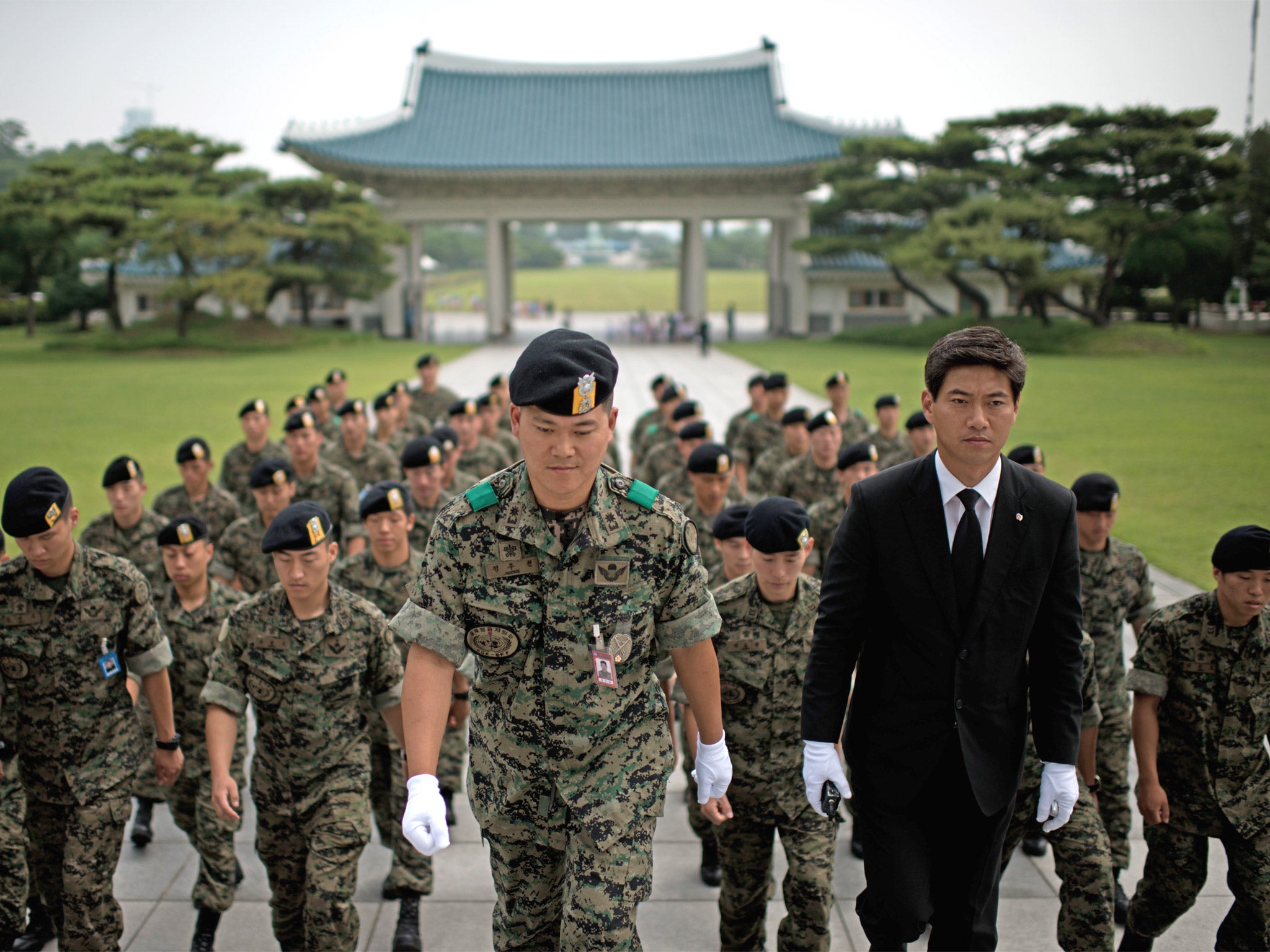Suicides, mass killings and murders prompt counselling for South Korea's under-pressure soldiers
The South’s army is in crisis in the midst of threats from the North

Your support helps us to tell the story
From reproductive rights to climate change to Big Tech, The Independent is on the ground when the story is developing. Whether it's investigating the financials of Elon Musk's pro-Trump PAC or producing our latest documentary, 'The A Word', which shines a light on the American women fighting for reproductive rights, we know how important it is to parse out the facts from the messaging.
At such a critical moment in US history, we need reporters on the ground. Your donation allows us to keep sending journalists to speak to both sides of the story.
The Independent is trusted by Americans across the entire political spectrum. And unlike many other quality news outlets, we choose not to lock Americans out of our reporting and analysis with paywalls. We believe quality journalism should be available to everyone, paid for by those who can afford it.
Your support makes all the difference.More than a million troops in North Korea suffer from hunger and poor equipment. But South Korea’s 640,000 soldiers are embroiled in discontent that threatens the command structure – and breaks out in periodic suicides and attacks on fellow soldiers.
Ten days ago, two young soldiers hanged themselves rather than face more bullying in their barracks south of the demilitarised zone that has divided the Korean peninsula since the end of the Korean War six decades ago. Then, on Wednesday last week, five soldiers were arrested for fatally beating another soldier.
South Korea’s Defence Minister, Han Min-koo, says such treatment was “shameful and regrettable”. He has called for officers to “overhaul the culture in barracks” so “soldiers can be treated with dignity”.
Such incidents are typical in a pattern that includes mass killings, murders and manslaughter. In the worst incident in June this year, a young draftee shot and killed five other soldiers and wounded five more at a guard post in a mountainous region near North Korea.
“As military service is compulsory, soldiers basically have negative ideas about enlistment,” says Dr Kim Kwang-sik, an expert in behavioural science at the Korea Institute for Defence Analyses. He worries about “building tension when faced with military confrontation with North Korea” – all factors that “continue to cause suicides”.
Some 774 soldiers have committed suicide in the past 10 years, but some observers doubt the accuracy of that number. “It’s very difficult to see what’s going on,” says Park Soo-hyun, a professor of clinical psychology at Yonsei University. “We suspect the real figure is more than that.”
Former army soldiers see the problem as reflecting a shift that defence-ministry experts are trying, without much success, to combat with counselling and testing. “Koreans are not as tough as they used to be,” says Kim Sung-hak, who served for two years and four months more than 20 years ago. “It’s really tough mentally,” Mr Kim says. “Isolation from society is torment.”
Kim Tae-woo, a former head of the Korea Institute for National Unification, traces the problem to how Koreans are taught history in secondary school. “Loyalty and identification with Korea seem to be a problem,” he says.
Koreans appear happy as they pack bars and coffee shops, crowd shopping malls and fill theatres in an era of rising prosperity, but pressures lie under the surface. “Life in Korea is accompanied by a lot of frustration and pressure,” Kim Tae-woo says.
Dr Kim Kwang-sik cites an array of schemes and directives for dealing with morale problems in the armed forces – though some of them appear ineffective. At the top of the list is a “code of conduct for army life” that is intended to combat “all acts in violation of military discipline such as beating, cruel or harsh treatment, insults, verbal abuse, offensive language, bullying or sexual abuse”.
He says “beatings and abusive acts have decreased” but acknowledges “harassing and bullying within the soldiers’ everyday lives have not been solved”.
Dr Kim says the number of counsellors is limited and “they are mostly focused on counselling highly suicidal or aggressive individuals”.
“Young soldiers are changing,” says Lee In-seop, a researcher with the Korea Human Rights Policy Institute. He says the military establishment is not attuned to the shift in attitudes. “It’s not a problem of being soft or strong,” Mr Lee says. “Military people could not follow the changes. Young soldiers cannot stand the situation. The atmosphere is different.”
South Korea spends $30bn (£17.8bn) annually on its defence. In five or 10 years its armed forces could be among the best equipped in the world.
But are young people up to the task of manning all that new equipment?
“What the government says is rhetorical,” says Chang Sung-hee, a teacher whose two brothers served as soldiers. “It does not reflect the actual situation. These days, many people have no hope.”
Join our commenting forum
Join thought-provoking conversations, follow other Independent readers and see their replies
Comments